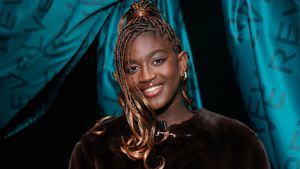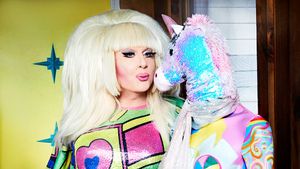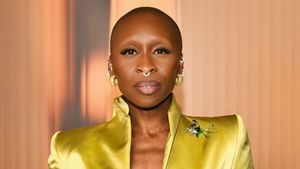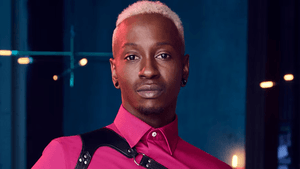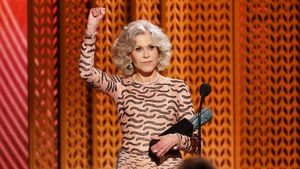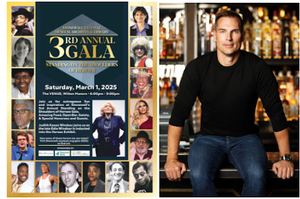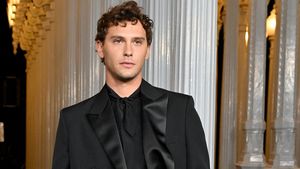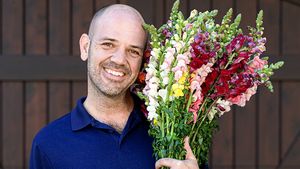I'm standing in a field of mud. It gets muddy here after it rains, and since we're only 20 miles from Lake Michigan that can happen frequently, even in July. There are naked and topless women all around me, probably the widest assortment of bodies I've ever seen. Not just black and white or young and old or skinny and fat; those are present, but really, we're talking about all the varieties of ways in which women's bodies develop, the hair, the boobs, the lines and scars that run across thighs and bellies and breasts that are sometimes as distinctive as snowflakes. Nobody seems to care about those differences, though. Sure, there are women hooking up. Everywhere. With 8,000 (mostly queer) women on the land, it'd be a surprise if they weren't. I always say, if you bring a girlfriend here, be prepared to leave without her, because time on the land is so transformative, almost rapturously romantic, that anything can and does happen. This female utopia, where women take shifts to chop carrots or make the campfires or do all-night security, is also safe. For most of us, it's the first or only time we've ever felt truly, 100 percent safe from harassment, objectification, judgment, violence, rape.
It's a muddy utopia. I love it. And I'll never see it again.
This magical, transformative female utopia has been around 40 years, and this year will be its last. I'm talking, of course, about the Michigan Womyn's Music Festival, the (mostly lesbian) feminist music festival once called the "women's Woodstock," which is built up over a month in the summer by women, who then staff, run, and attend a week of music, crafts, workshops, games, sex, and laughter.
Since a trans woman, Nancy Burkholder, was asked to leave the festival in 1991, there's been a split over Michfest that's caught cisgender queer women like myself in the middle of this polarizing debate without a voice, while trans-exclusionary radical feminists, or TERFs, have trumpeted Michfest cofounder Lisa Vogel's refusal to allow trans women on fest grounds as some sign they are winning a sort of Matrix-like battle between lesbian feminists and transgender women.
TERFs want you to believe the women who attend Michfest -- you know, those average lesbian feminists -- don't want or accept trans women as "real" women, don't feel safe around trans women, and certainly don't want to share their "sacred space" with them.
All of that is bullshit.
While one survey in 1993 showed that over 70 percent of women at the fest didn't want trans women there, much has changed in the 22 years since. (In 1993 most Americans didn't believe in same-sex marriage, and look at us now.) One big change is that we all know of trans women now and know more about trans issues, thanks to women like Janet Mock, Laverne Cox, and dozens of others. We've come to understand and care for them the same way straight America has learned to love lesbians through Ellen DeGeneres.
Informal surveys in recent years show the vast majority of women attending Michfest want trans women to be allowed in the festival, and they are not fearful they'll be attacked in the shower by some trans boogeyman of festival lore. The TERFs don't want you to know this, though; they want you to think that lesbians do not support trans women, which is farthest from the truth. There have always been some naysayers, but queer trans women have been part of the lesbian feminist movement since the 1960s.
Since 1991, Vogel has offered up various statements about why trans women cannot or should not attend the fest. The most recent version sounded a bit like a "don't ask, don't tell" edict, one that leaves "the onus on each individual to choose whether or how to respect" Michfest's intention that the fest is for only womyn-born women (which, in Vogel's mind, does not include transgender women because they did not grow up in female bodies, though most psychologists would disagree).
Trans women have actually always been at Michfest; I have a trans friend who even performed there, but those women had to pass and remain stealth (that is, closeted) at the fest. It's a tough call for a trans lesbian feminist and an unwarranted one at that.
Last year Emily Dievendorf, who was until this month the executive director of Equality Michigan, launched a petition calling for a boycott of the fest until Vogel changes the policy, and this year two of the major national organizations run by lesbians (the National Center for Lesbian Rights and the National LGBTQ Task Force) withdrew their support of the boycott due to rumored "negotiations" with Vogel. It looked to trans women like lesbians were throwing them under the bus again.
Then Vogel announced on Facebook that this Michfest, the 40th, would be the last, saying, "We have known in our hearts for some years that the life cycle of the Festival was coming to a time of closure. Too often in our culture, change is met only with fear, the true cycle of life is denied to avoid the grief of loss. But change is the ultimate truth of life. Sisters -- I ask you to remember that our 40 year Festival has outlived nearly all of her kin. She has served us well. I want us all to have the opportunity to experience the incredible full life cycle of our beloved Festival, consciously, with time to celebrate and yes, time to grieve."
Vogel alluded to the trans issue only obliquely: "The Festival has been the crucible for nearly every critical cultural and political issue the lesbian feminist community has grappled with for four decades. Those struggles have been a beautiful part of our collective strength; they have never been a weakness."
Since then we've seen numerous statements placing blame for the shutdown, so you don't want more talking heads. You want the truth. And here it is: Lisa Vogel is wrong. The TERFs are wrong. The number of women who actually identify as or with the TERFs is actually very, very small but disproportionately vocal. And when one has power, like Cathy Brennan, it can do a lot of damage.
Vogel is a different kind of TERF than Brennan. She sounds peaceful and reasonable, and she's spent 40 years cultivating a festival that has bordered on sheer wonder at times. (During the years that Barbara "Boo" Price was involved, the growth of the festival to a weeklong event was incredible; in the '90s it saw the addition of young radical bands like the knife- and dildo-wielding Tribe 8 as well as mainstream performers like the Indigo Girls).
In the last two years, many of the performers have withdrawn from the fest, including the Indigo Girls, Nona Hendryx, and JD Samson. Many women of color performers did not, arguing that they too supported trans women but couldn't give up the income they made from the festival. They made economic choices that often came with a political backlash. Many, if not most, performers who stayed on did so with a statement in support of trans women and the festival.
It's clear that women (or womyn) who attend the fest and those who perform at Michfest have wanted trans women to be a part of their celebration. Vogel -- and perhaps her small band of die-hard supporters -- did not. And so she fought until it was unreasonable to fight anymore and she shut it down.
This is called cutting off your nose to spite your face. Sure, perhaps it's a purely economic decision: use the trans controversy to cover a failing economic venture. In recent years the festival, once attended by nearly 10,000 women each year, has been declining in attendance and popularity. Last year, AutoStraddle reported that attendance was closer to 3,000. It's a trend. Many women's music festivals -- once our safe gathering space and alternative to the bar scene -- have shuttered already, including the popular West Coast Women's Music & Cultural Festival, which was founded by Robin Tyler in part to give trans and gender-nonconforming women a welcoming place among other lesbian feminists.
But the largest music festival, National Women's Music Festival, which has always been trans-inclusive (in fact, all genders are welcome at the four-day bash) sees attendance that is apparently as robust as ever.
So you can't say that women's music festivals are all going the way of the dodo bird or that Michfest couldn't live on under new management if Vogel was ready to retire. Let's admit that Vogel and the fest have been under intense pressure the last several years and that has hit the bottom line. And instead of bending, instead of inviting in trans women and letting those organizations like Equality Michigan and NCLR triumphantly support this new, growing festival -- perhaps broadening the economic power base, attracting new and returning performers, and welcoming new revenue from these new attendees -- instead of all that, Vogel decided to shut it down. Michfest chose to shut down rather than change. You can't help but feel rejected because of that.
Dievendorf told me that in discussions with Vogel, she "also mentioned that I knew fest was struggling and that I heard and respected the great value it had for many women. I offered that if we could make it clear that trans* women were not just allowed on the land but welcome and recognized as equal in their womanhood that I would even promote a new and inclusive Michfest to make the 40th year the festival's best. We both did much listening. We came to no resolution."
Which is the biggest shame. Because, the way this will get written in history books is that there was a fight between lesbian feminists and transgender women, one that played out in the 2010s via Michfest and social media, that trans women won, that the fest was forced to close.
But honestly, that wasn't what really happened. Make no mistake that: (a) This was not lesbian feminists versus trans women. Most lesbian feminists, most queer feminists, respect and value trans women and want them in the movement and know that they belong. This was Vogel and her supporters versus trans women. We cannot let TERFs steal the mantle of "radical feminist" from us because despite what some hatemongers like Brennan may try to prove otherwise, we know there are more trans-loving radical feminists than there are of the others.
And (b) trans women didn't win here. When an organization shuts down rather than letting you in, nobody wins. It's a wash. If you want to sit in the front of the bus but instead the driver takes it off a cliff so you can't, well, that's not a win for anyone. Trans women didn't just want to "win" this to make a political statement for trans people; they wanted to go to a damn music festival surrounded by their friends and thousands of other women.
Nobody won this week.
My friend Faith Cheltenham, a bisexual activist who is a strong trans ally, thinks I should be OK with the Michfest shutdown. She certainly is. "So be it," she told me. "Progress for some too quickly turns into progress for none. I look forward to an event that's welcoming of all LGBT** women, we deserve that space and we are worthy of it. Every single one of us."
I guess the question is, Now will we get that?
* Dievendorf uses trans* to reflect the umbrella of trans identities.
**Cheltenham uses LGBT, rather than just LBT, to include women who identify as "gay" rather than "lesbian."


































